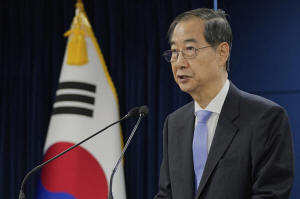South Korean Prime Minister Han Duck-soo reinstated as acting president
after impeachment overturned
[March 24, 2025]
By HYUNG-JIN KIM
SEOUL, South Korea (AP) — South Korea’s Constitutional Court overturned
the impeachment of Prime Minister Han Duck-soo, reinstating the nation's
No. 2 official as acting leader Monday while not yet ruling on the
separate impeachment of President Yoon Suk Yeol over his shocking
imposition of martial law late in December.
Many observers said the 7-1 ruling in Han's case did not signal much
about the upcoming verdict on Yoon, as Han wasn’t a key figure in
imposing martial law. But the ruling could still embolden Yoon’s staunch
supporters and ramp up their political offensive on the opposition.
Speaking with reporters following his reinstatement, Han thanked the
court for what he called “a wise decision” and promised to focus on
tackling “urgent matters,” including a fast-changing global trade
environment, in an apparent reference to the Trump administration’s
aggressive tariffs policy. He also called for national unity, saying:
“There’s no left or right — what matters is the advancement of our
nation.”
South Korea has been thrown into huge political turmoil, since Yoon, a
conservative, declared martial law on Dec. 3 and sent hundreds of troops
to the liberal-controlled National Assembly and other places in Seoul.
Yoon's decree lasted only six hours as enough lawmakers managed to enter
an assembly hall and voted it down quickly.
The impeachment arguments
The assembly impeached Yoon on Dec. 14, alleging he violated the
constitution and other laws by suppressing assembly activities and
trying to detain politicians. Yoon's impeachment made Han acting
president until he was impeached in late December.

The unprecedented, successive impeachments that suspended the country’s
top two officials intensified domestic division and deepened worries
about the country’s diplomatic and economic activities.
Han, who attempted to reassure diplomatic partners and stabilize markets
during his time as acting president, was accused in the impeachment
motion of abetting Yoon’s martial law declaration and obstructing
efforts to restore the Constitutional Court’s full membership and
investigate Yoon’s alleged rebellion.
The nine-member court at the time had three vacancies, but ousting Yoon
would require support from at least six justices. After Han was
suspended, his successor as acting president, Choi Sang-mok, appointed
two new justices but left the ninth seat vacant.
Seven of the Constitutional Court's eight justices ruled to overturn or
dismiss Han's impeachment. They ruled the accusations against him
weren’t against the law or weren’t serious enough to remove him from
office or his impeachment motion didn't even met a required quorum when
it passed thorough the assembly. One justice upheld Han’s impeachment.
[to top of second column]
|

South Korean acting President Han Duck-soo speaks during a briefing
at the Government Complex in Seoul, South Korea, Monday, March 24,
2025. (AP Photo/Ahn Young-joon, Pool)

The Democratic Party expressed regret over the court’s decision to
reinstate Han and urged it to dismiss Yoon's case quickly. Yoon’s
office welcomed Monday’s ruling, saying it shows again the
opposition’s abuse of impeachment motions were “reckless, malicious
political offensive.”
What's next?
Observers earlier had predicted the Constitutional Court would rule
on Yoon’s case in mid-March, but it hasn’t done so, sparking varied
speculation on possible reasons.
“Today’s verdict will give hope to Yoon’s supporters for a similar
fate and hope for Yoon’s opponents for his ouster,” said Duyeon Kim,
a senior analyst at the Center for a New American Security in
Washington. “But it’s too soon to predict the court’s verdict on
Yoon because the specific details of both cases and allegations are
different.”
Kim said the the reinstatement of Han, a career bureaucrat, will
bring more stability to South Korea compared to when his powers as
acting president were suspended.
Massive rival rallies backing Yoon or denouncing Yoon have divided
the streets of Seoul and other major cities in South Korea. Earlier
surveys showed that a majority of South Koreans were critical of
Yoon’s martial law enactment, but those supporting or sympathizing
with Yoon have later gained strength.
Yoon argues that his martial law introduction was a desperate
attempt to bring attention to the “wickedness” of the main liberal
opposition Democratic Party which obstructed his agenda and filed
many impeachment motions against senior officials. Yoon critics
counter he likely tried to use military rule to frustrate possible
special investigations into scandals involving him and his wife.
Senior military and police officers sent to the assembly have said
that Yoon ordered them to drag out lawmakers to prevent a floor vote
to overturn his decree. Yoon says the troops' deployment was
designed to maintain order.
If the court upholds Yoon’s impeachment, South Korea must hold a
presidential election to choose his successor. If it rules for him,
Yoon will regain his presidential powers.
Yoon has separately been charged with rebellion in connection with
his martial law decree, a charge that carries the death penalty or a
life sentence if he is convicted.
___
Associated Press writer Kim Tong-hyung contributed to this report
All contents © copyright 2025 Associated Press. All rights reserved |